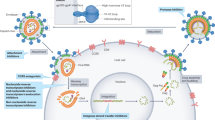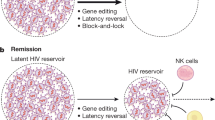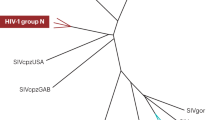Abstract
WHETHER zidovudine (3′-azido-3′-deoxythymidine, AZT) should be offered to symptomless individuals infected with human immunodeficiency virus type-1 (HIV-1), in the hope of delaying or even preventing progression to AIDS, has been much debated1. The discussion has focused on the efficacy of the drug in delaying progression to disease2, the severity of its side-effects3, and the likelihood of its prolonged and widespread use resulting in zidovudine-resistant strains of the virus4. Little attention has been given to the degree to which treatment reduces the infectiousness of symptomless patients, and to the concomitant implications for the overall transmission rate of HIV-1 in the community. Here we use simple mathematical models to show that community treat-ment with antiviral drugs or immunotherapies that lengthen the incubation period of AIDS without significantly reducing the infectiousness of treated individuals, can increase the rate at which HIV-1 infection spreads (which is fairly obvious) and can even, under certain circumstances, increase the AIDS-related death rate in the community (which is less obvious).
This is a preview of subscription content, access via your institution
Access options
Subscribe to this journal
Receive 51 print issues and online access
$199.00 per year
only $3.90 per issue
Buy this article
- Purchase on Springer Link
- Instant access to full article PDF
Prices may be subject to local taxes which are calculated during checkout
Similar content being viewed by others
References
Lancet i, 415–416 (1989).
Fischl, M. A. et al. N. Engl. J. Med. 317, 185–191 (1987).
Richman, D. D. et al. N. Engl. J. Med. 317, 192–197 (1987).
Larder, B. A., Darby, G. & Richman, D. D. Science 243, 1731–1734 (1989).
Volberding, P. A. et al. N. Engl. J. Med. 322, 941–949 (1990).
Ho, D. D., Moudgil, T. & Alan, M. N. Engl. J. Med. 321, 1621–1625 (1989).
Coombs, R. W. et al. N. Engl. J. Med. 321, 1626–1631 (1989).
Ratner, L. AIDS Res. hum. Retrovir. 5, 115–119 (1989).
Moss, A. R. et al. Br. med. J. 296, 745–750 (1988).
Laurian, Y. et al. N. Engl. J. Med. 320, 183 (1988).
Jackson, G. G. et al. Ann. intern. Med. 108, 175–180 (1988).
McLean, A. R. et al. J. math. Biol. (in the press).
Anderson, R. M. J. AIDS 3, 417–429 (1990).
Anderson, R. M. et al. IMA .J. math. appl. med. Biol. 3, 229–263 (1986).
Capon, D. J. et al. Nature 337, 325–531 (1989).
May, R. M. & Anderson, R. M. Nature 326, 137–142 (1987).
Anderson, R. M. J. R. statist. Soc. Ser. A. 151, 66–93 (1988).
Anderson, R. M. & May, R. M. Lancet 335i, 641–645 (1990).
Author information
Authors and Affiliations
Rights and permissions
About this article
Cite this article
Anderson, R., Gupta, S. & May, R. Potential of community-wide chemotherapy or immunotherapy to control the spread of HIV-1. Nature 350, 356–359 (1991). https://doi.org/10.1038/350356a0
Received:
Accepted:
Issue Date:
DOI: https://doi.org/10.1038/350356a0
This article is cited by
-
Analyzing on stability of HIV-PI model with general incidence rate
Journal of Applied Mathematics and Computing (2018)
-
Mathematical models for the study of HIV spread and control amongst men who have sex with men
European Journal of Epidemiology (2011)
-
HIV/AIDS Model with Delay and the Effects of Stochasticity
Journal of Mathematical Modelling and Algorithms (2011)
-
Mathematical Analysis of a Two Strain HIV/AIDS Model with Antiretroviral Treatment
Acta Biotheoretica (2009)
-
Antiretroviral therapy to treat and prevent HIV/AIDS in resource-poor settings
Nature Medicine (2002)
Comments
By submitting a comment you agree to abide by our Terms and Community Guidelines. If you find something abusive or that does not comply with our terms or guidelines please flag it as inappropriate.



